How much do you know about the early Chinese translations of Marx and Engels’ works
The 100-volume series of "A General Examination of the Dissemination of Marxist Classical Documents" will be published soon. This is the first time that Chinese translations of Marx and Engels’ works before the founding of People’s Republic of China (PRC) have been compiled together by photocopying, which will make the study of the early dissemination history of Marxism in China a big step forward qualitatively. The "translation" here refers to the works of Marx and Engels published separately in China, including monographs and their translated versions, selected letters and special collections; Second, it refers to the complete translations of Marx and Engels’ works in periodicals or newspapers in the form of serials and in other collections. A translation is different from a version, and the translation is based on the translator. The same translation may be printed by different publishers for many times, resulting in multiple versions. So, before 1949, how many Chinese versions of Marx and Engels’ works were there?
In 1899, Chinese learned the names of Marx and Engels. The titles, fragments and abridged translations of some works of Marx and Engels have appeared in many books, periodicals and newspapers in China. For example, Li Dazhao once translated several passages from Poverty of Philosophy, communist party Declaration and Das Kapital, and the English version of the communist party Declaration was published in the Japanese newspaper Tianyi, and the translator Min Ming also translated the first chapter of the communist party Declaration. However, due to the incomplete translation, readers can’t accurately understand Marx and Engels’ theoretical viewpoints, so this series has not included it as a translation. Mao Zedong once said: "Some people, such as Liang Qichao and Zhu Zhixin, once mentioned Marxism. It is said that there is someone who translated Engels’ The Development of Socialism from Utopia to Science in a magazine. This man is Shi Renrong, who translated and published Engels’ book in the bimonthly New World in Shanghai in 1912, and then translated it as Ideal Socialism and Implementing Socialism. Shi Renrong’s translation is not a complete translation, which fails to translate several paragraphs at the end of the third part of the original work and a brief overview of the whole development process at last. At the same time, it is more accurate to call it "translation narration", including the translator’s own narrative elements, which do not strictly follow the narrative logic of Engels’ original works and have been deleted and added in content. Therefore, this series has not been included.
During the May 4th Movement, from May 9th to June 1st, 1919, Beijing Morning Post serialized Labor and Capital, which is now translated as Hired Labor and Capital, and the translator signed it. This is a work published by Marx in the New Rheinische Zeitung in 1849 and published separately in 1891. Because the translation is complete, it is called Hired Labor. In July 1921, before the founding of the Communist Party of China (CPC), there were two Chinese versions of Marx and Engels’ works, namely, the Chen Wangdao version of the communist party Declaration published by the Shanghai Institute of Socialism in August 1920, which was the first complete and separate Chinese translation of this classic work of Marx and Engels. Almost at the same time, Shanghai Qunyi Bookstore published Engels’ Zheng Cichuan translation of Socialism from Utopia to Scientific Development, which was then translated as Scientific Socialism.
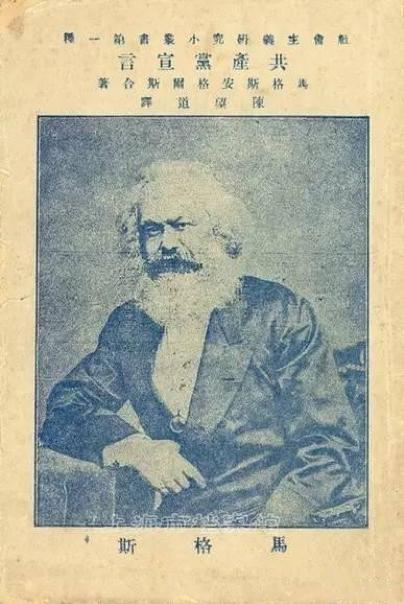
Chen Wangdao version of the communist party Declaration
After the founding of the Communist Party of China (CPC), several versions appeared in China: Yuan Rang’s version of Wage Labor and Capital, published by Guangzhou People’s Publishing House in December 1921, was translated as Wage Labor and Capital; On May 15th, 1922, Xiong Deshan’s translation of Critique of the Gotha Program was published in No.4 (Marxt), Volume I of Beijing Today Magazine, which was translated as Critique of the Gotha Program. Li Ji’s translation of Wages, Prices and Profits was published by the Commercial Press in October 1922, and it was translated as Value Price and Profits. On April 10th, 1923, the translation of Critique of Gotha Program was published in New Era, Volume 1, No.1, Hunan Self-study University, and it was translated as Criticism Outside the Program of the German Labor Party. The Development of Socialism from Utopia to Science; Li’s English version was serialized in the supplement of Shanghai National Daily from February to March in 1925, and it was translated as Utopian and Scientific Socialism. Peng Xuepei’s translation of Critique of Gotha Program was serialized in Xuedeng magazine, a supplement of Shanghai Current Affairs News, in May 1925, and translated as Critique of the Program of the German Labor Party. Li Chunfan’s translation of Critique of Gotha Program was published by Shanghai Liberation Series in August 1925, and it was translated as Critique of Gotha Program. The Zhu Jingwo version of Socialism from Utopia to Scientific Development was published by Shanghai Creation Society in May, 1925, and it was translated as the Development of Socialism. So far, there are 11 complete Chinese translations of Marx and Engels’ works in China.
After the failure of the Great Revolution in 1927, the organization of the Communist Party of China (CPC) was destroyed. However, the leaders of the Party and the United and progressive cultural workers continued to spread Marxism and compiled and published the classic works of Marx and Engels in the white terror environment. From 1927 to 1937, before the full-scale outbreak of War of Resistance against Japanese Aggression, the collected translations can be divided into the following categories:
The first category is that the works published by Marx and Engels were translated into Chinese, including Lu Yiyuan’s translation of The French-German Peasant Problem, which was published by Shanghai Far East Book Company in May 1928. Huang Siyue’s translation of "The Development of Socialism from Utopia to Science" was published by Shanghai Taidong Bookstore in August, 1928, and it was translated as "Outline of Socialist Development". In May 1929, Shanghai Taidong Book Bureau published Zhu Yingqi’s translation of Wage, Price and Profit, Zhu Yingqi’s translation of Hired Labor and Capital, and Yin Zhu Society’s translation of the latter. The Origin of Family, Private Ownership and State was translated by Ying Li Yang and published by Shanghai New Life Bookstore in June, 1929. Du Zhujun’s translation of The Poverty of Philosophy was published by Shanghai Shuimo Bookstore in October, 1929. Peng Jiasheng’s translation of "The End of ludwig feuerbach and German Classical Philosophy" was published by Shanghai Qiangshu Company in December 1929 and translated into Feuerbach. Liu Man’s translation of Criticism of Political Economy was published by Shanghai Lequn Bookstore in March, 1930, and it was translated as Economic Criticism. The translation of ludwig feuerbach and the End of German Classical Philosophy was published by Shanghai Jiangnan Bookstore in April 1930, and it was translated as Feuerbach and the End of Classical Philosophy. LouisThe 18th Foggy Moon of Bonaparte translated by Chen Zhongtao was published by Shanghai Nanqiang Bookstore in May, 1930, and it was translated as The Third Coup of Napoleon. Liu Jingyuan’s translation of German Revolution and Counter-Revolution was published by Shanghai New Life Publishing House in May 1930, and it was translated as Revolution and Counter-Revolution. Zou Zhongyin’s translation of "Speech on Free Trade" was published by Shanghai United Bookstore in August 1930 and translated as "Free Trade". Wu Liping’s translation of Anti-Turin Theory was published by Shanghai Jiangnan Bookstore in November 1930. Qian Tieru’s translation of Anti-Turin Theory was published by Shanghai Kunlun Bookstore in December, 1930, and it was translated as Anti-Turin Theory. Hua Gang’s translation of the communist party Declaration was published by the Shanghai Chinese and Foreign Social Science Research Society in 1930, and it was translated as the Declaration. Guo Moruo’s translation of Critique of Political Economy was published by Shanghai Shenzhou Guoguang Society in December 1931. The Xu Deheng version of The Poverty of Philosophy was published by Beiping East Asia Bookstore in July 1932, and it was translated as The Poverty of Philosophy. Du Wei’s translation of Dialectics of Nature was the only complete translation before the founding of the People’s Republic of China, which was published by Shanghai Shenzhou Guoguang Society in August 1932. The Qing Li version of The End of ludwig feuerbach and German Classical Philosophy was published by Shanghai Socialist Research Society in November 1932, and it was translated as Feuerbach. In 1932, there were two versions of Engels’ book German Peasant War, namely, Qian Yishi’s translation published by Shanghai Shenzhou Guoguang Society, and Li Yixin’s translation published by Shanghai Lehua Book Company.The latter was translated as German Peasant War.
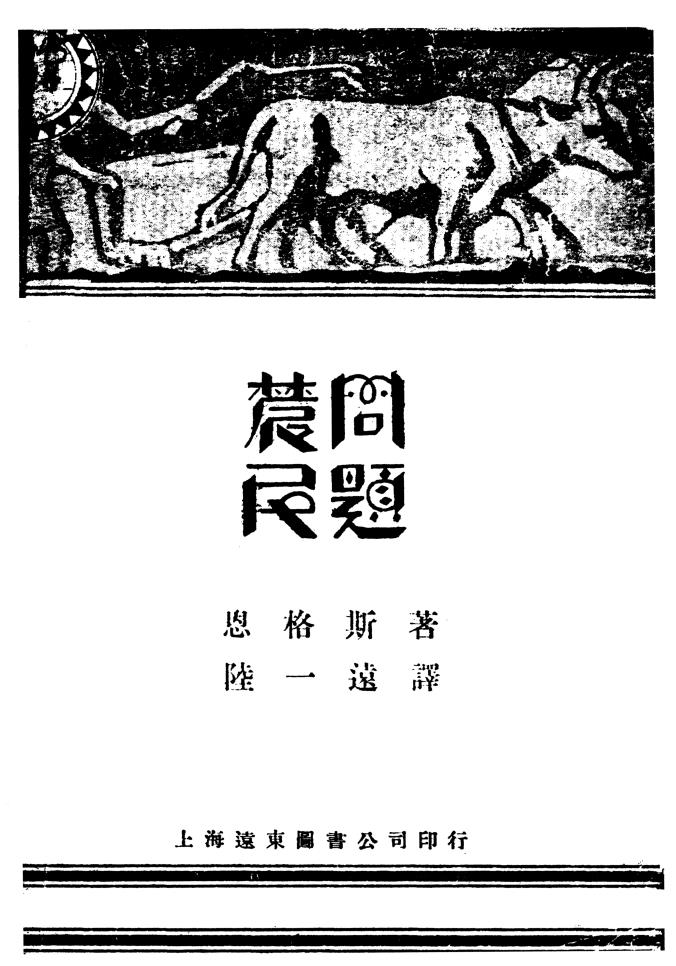
Lu Yiyuan’s Translation of the Franco-German Peasant Problem
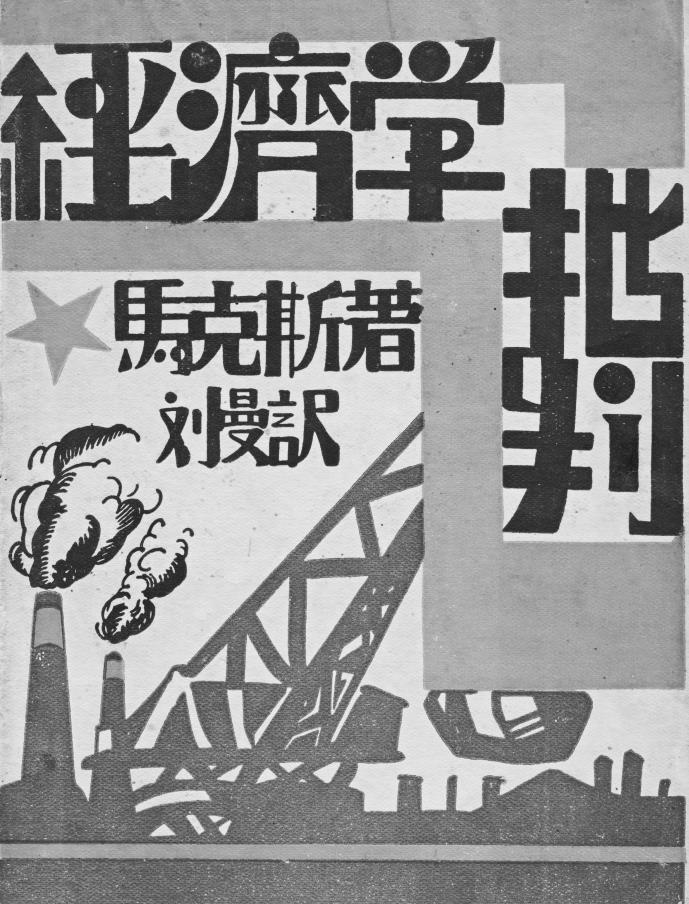
Liu Man’s Translation of Critique of Political Economy
The second category is the translated version published separately, including the translation of Lu Yiyuan’s section of Dialectics of Nature, and the section of "The Role of Labor in the Transformation from Ape to Man" in Engels’ Dialectics of Nature, which was published by Shanghai Chunchao Bookstore in November 1928 and translated as "The Origin of Marxist Race". The translation of Dialectics of Nature into Song Festival was published by Shanghai Taidong Book Bureau in September, 1930, and it was translated as From Ape to Man. Guo Moruo’s translation of the Holy Family, in which the contents of the fifth and eighth chapters are abridged, was published by the Tokyo Literature and Art Society in May 1936, and its translation was called Authenticity of Works of Art.. Marx’s masterpiece Das Kapital has not yet had a complete translation in this period, and even the first volume was completed in the form of abridged translation and relay. Das Kapital (Volume I, Volume I, Volume I) was first translated by Chen Qixiu and published by Shanghai Kunlun Bookstore in March 1930, while Volume I, Volume II and Volume III were translated by Pan Dongzhou, respectively. In September 1932, Das Kapital (the first volume) was translated into Chinese by Wang Shenming and Hou Wailu, and published by Beijing International Society. Four years later, the second volume and the middle volume were published by the World Famous Works Translation Society. The two translators were named Yu Shu and You Ming respectively. According to the naming rules, the former is called Wang Shenming’s translation and Hou Wailu’s translation, while the latter must be called Yu Shu and You Ming’s translation. In addition, Das Kapital (Volume I, Volume I)The translations of Wu Bannong and Qianjiaju were published by the Commercial Press in May 1934, and have not been translated since then.
The third category is the translations included in other collections. In October 1929, the book Religion, Philosophy and Socialism compiled by Lin Chaozhen was published by Shanghai Hubin Bookstore, which included Engels’ two works, The Development of Socialism from Utopia to Science and The End of ludwig feuerbach and German Classical Philosophy. It can be called Lin Chaozhen’s translation, which was then translated into Utopian Socialism and Scientific Socialism. In February, 1930, the Shanghai Social Science Research Association published Selected Translations of Marx’s Papers compiled by Li Yimang, which included Critique of the Gotha Program and Wage Labor and Capital, which can be called Li Yimang’s translation, and translated into Critique of the Gotha Program and Wage Labor and Capital. In March 1930, the book The Basis of Marxism published by Shanghai Social Science Research Society included Engels’ Principles of Communism and Wage Labor and Capital, namely Pan Hongwen’s translation. In addition, The Critique of Materialism of Mechanism, published by Shanghai Kunlun Bookstore in May, 1932, completely included The End of ludwig feuerbach and German Classical Philosophy, which can be called the translation of Yang Dongkui and Ning Dunwu. So far, the number of Chinese versions has reached 49.
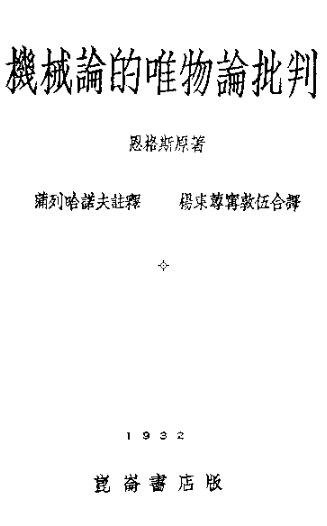
Critique of Materialism of Mechanism: Yang Dongchong’s and Ning Dunwu’s Translation
From the outbreak of War of Resistance against Japanese Aggression to the founding of People’s Republic of China (PRC), the number of translations of Marx and Engels’ works in China continued to increase, and Yan ‘an became the publishing center of Marxist classics. During this period, there was a compilation of Marx and Engels’ expositions on China, and a translation of Fang Naiyi by Wuhan China Publishing House in March 1938, entitled "Ma En on China"; In addition, in November 1938, Yang Kezhai’s translation of Zhulin Bookstore in Shanghai was entitled "Comments on China". There are also excerpted versions of the discourses on literature and art in Marx and Engels’ works, such as Yi Yi’s translation entitled "On the Art of Science" by Shanghai Reading Publishing House in October 1940 and Ouyang Fanhai’s translation entitled "On the Literature of Marx and Engels" by Reading Life Publishing House in November 1939. In December 1939, Yan ‘an Eighth Route Army Military and Political Magazine published the translation of Selected Works of Engels’ Military Papers (Volume I), and its subsequent volumes were published after the founding of the People’s Republic of China. In 1940, Engels’ literature on the British Workers’ Movement was compiled by Wu Wentao and published in China Workers’ Society in Yan ‘an, with the title "The British Workers’ Movement".
During this period, China also compiled five kinds of anthologies of Marx and Engels’ letters, namely, Guo Dali’s translation of Capital Correspondence Collection in April 1939, Ke Bainian’s and Ai Siqi’s translation of Marx’s Letter to Gugeman in June 1939, Lin Chaozhen’s translation of Marx’s Letter to Gugeman in May 1947, and Letter to Dr. Gugeman in April 1948.
During this period, three volumes of Das Kapital were published in full translation, namely, Guo Dali’s and Wang Yanan’s translations, which were published continuously by Reading Life Publishing House from August to September, 1938. In 1940, Guo Dali’s and Peng Dixian’s versions of Addendum and Corrigendum to Das Kapital were also published. Related to this, the three-volume Theory of Surplus Value, known as the fourth volume of Das Kapital, also published Guo Dali’s translation in May 1949. In order to deeply study Marx’s viewpoints in Das Kapital, China has also compiled and published a series of articles on Engels’ interpretation of the book, including two versions of Engels’ On Das Kapital published in January 1939, translated by Zhang Hanfu and Xu Dixin, and translated by He Xilin published in August 1939.
During this period, there were two versions of the Development of Socialism from Utopia to Science that were not signed by the translator, which could be called the anonymous version of the Development of Socialism from Utopia to Science. The other one was published by Hankou Xinhan Publishing House in April, 1938, and it was translated as "From Utopian Socialism to Scientific Socialism". These two versions can only be distinguished according to the publishing unit. There is also an anonymous translation of the Origin of Family, Private Ownership and State, which was published by Minghua Publishing House in June 1938 and translated into the Origin of Family, Private Property and State.
During this period, there are also Chinese translations of ludwig feuerbach and the End of German Classical Philosophy, which were translated by Zhang Zhongshi in 1937 and Cao Zhen in 1949. The Development of Socialism from Utopia to Science was translated by Wu Liping in 1938, Bo Gu in 1943 and Cao Zhen in 1949. The communist party Declaration was translated by Cheng Fangwu and Bing Xu in 1938, Bo Gu in 1943 and Moscow in 1943. Wages, Prices and Profits were translated westward in 1938 and translated by Wang Xuewen in 1939. Guo Moruo’s translation of German Ideology in 1938 and Kirsch’s translation in 1941; The French Civil War was translated by Wu Liping and Liu Yun in 1938 and Guo He in 1939. On the Jewish Problem, translated by Guo He in 1939; Wang Xuewen’s translation of wage labor and capital in 1939 and Shen Zhiyuan’s translation in 1939; German Revolution and Counter-Revolution, 1939 translated by Wang Shiwei and Ke Bainian; Critique of the Gotha Program: He Sijing and Bing Xu’s translation in 1939; The 18th Fog Moon in louis bonaparte, a 1940 translation by Robert Coburn; The role of violence in history, Cao Ting’s translation in 1940; Family, Private Ownership and the Origin of the State translated by Zhang Zhongshi in 1941; Cao Ting’s translation of the Franco-Prussian War in 1941; The Class Struggle in France, a 1942 edition by Robert Copernicus; Dialectics of Nature translated by Yu Guangyuan and Cao Baohua in 1948; Lin Ruo’s 1949 translation of Principles of Communism;The Poverty of Philosophy translated by He Sijing in 1949, and so on. Chen Shoushi’s translation of the communist party Declaration is included in the appendix of Comparative Economic System, and the publication time is unknown, which belongs to the translation before 1949. In addition, Liu Man’s translation of Marx’s Speech on Free Trade and Guo Moruo’s translation are included in the appendix of Critique of Political Economy respectively. Before the founding of People’s Republic of China (PRC), there were 98 Chinese translations of Marx and Engels’ works in China.
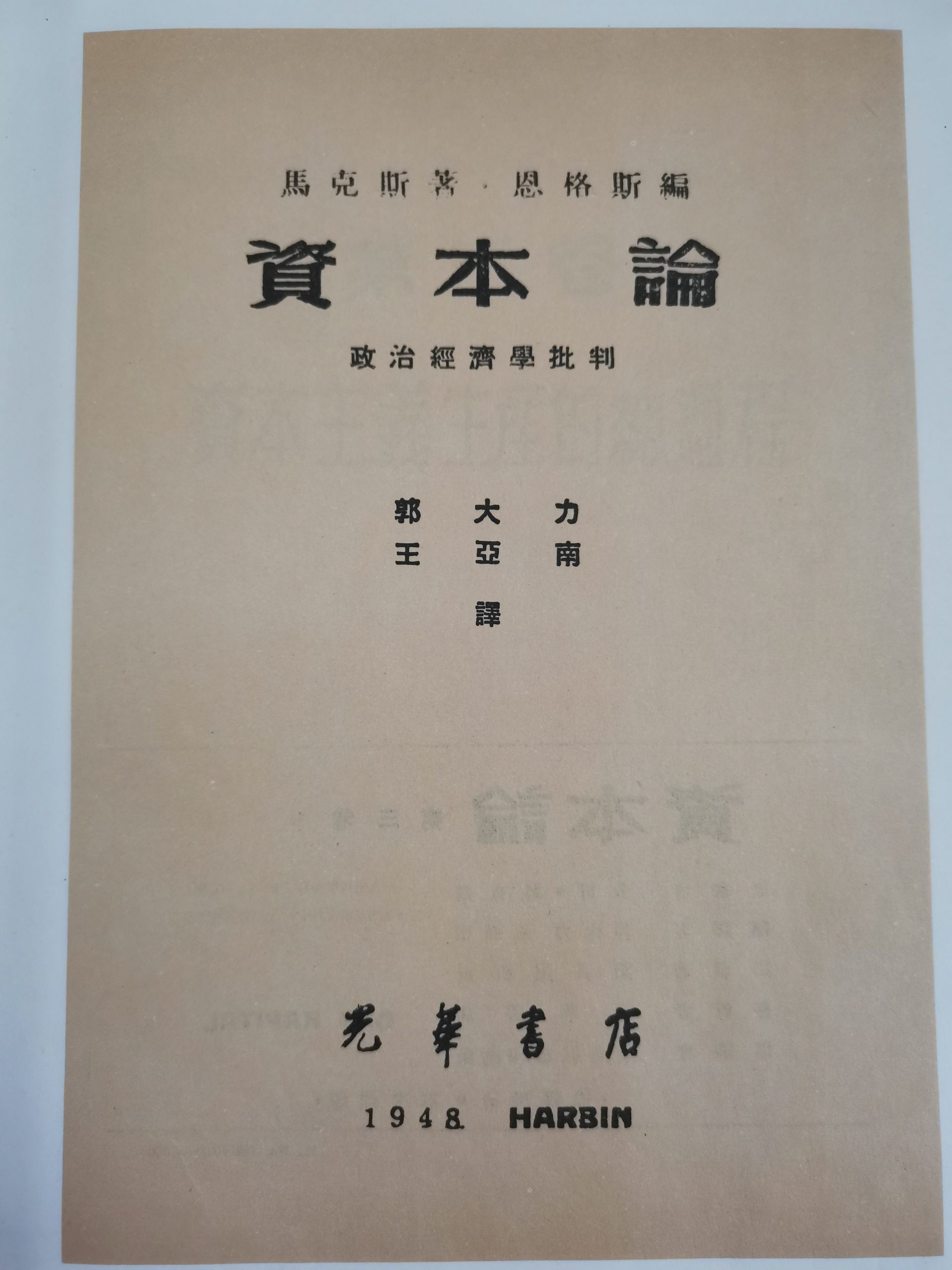
Guo Dali and Wang Yanan’s Translation of Das Kapital
In the process of editing the 100-volume series, we corrected the inaccuracies in the previous materials according to the originals, photos and textual research methods. Due to the limitation of the publishing scale of the series, the 100-volume series failed to fully include all the translations before the founding of People’s Republic of China (PRC), and some translations were not collected due to the age, which still needs further textual research.
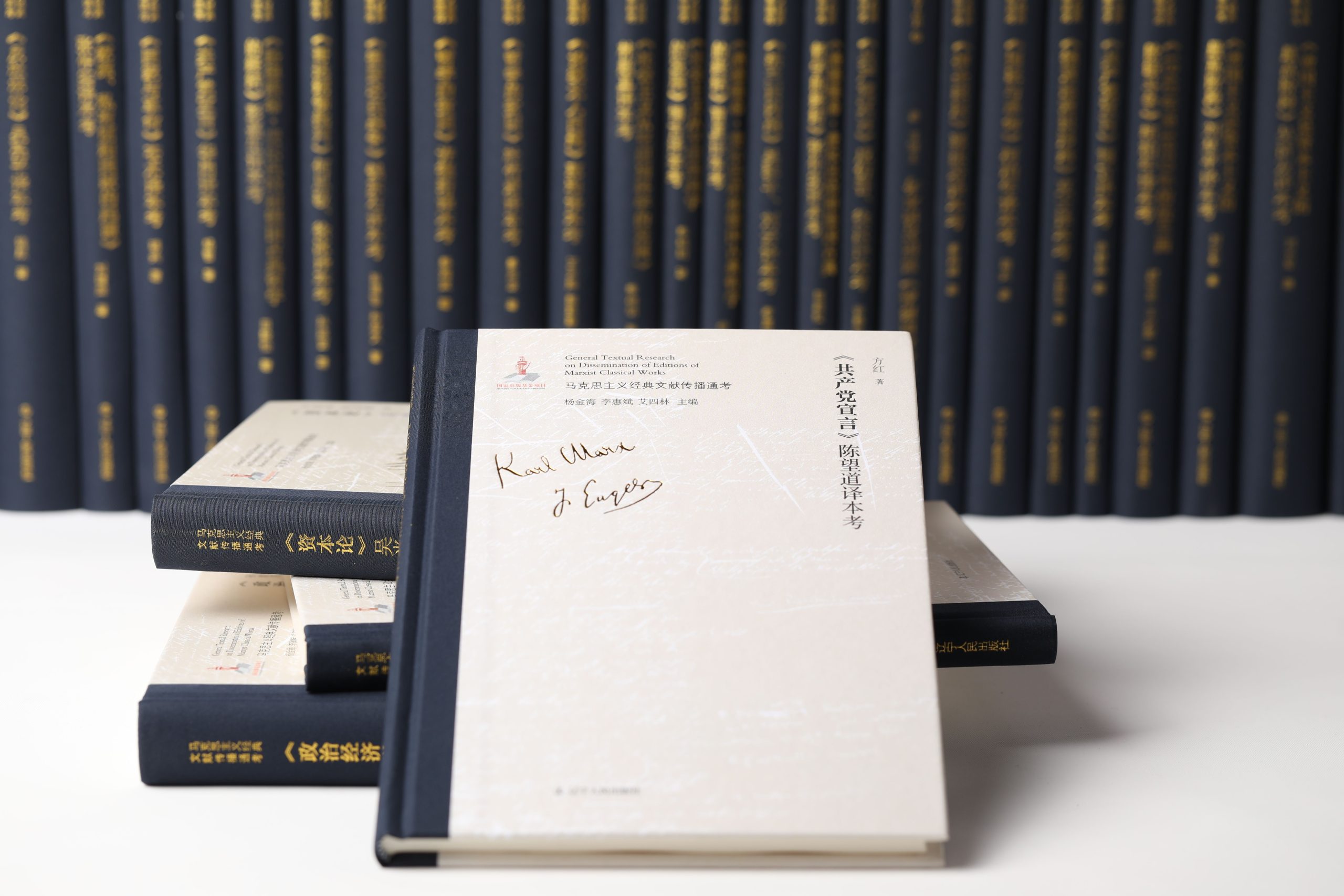
Series of General Examination on the Dissemination of Marxist Classical Documents
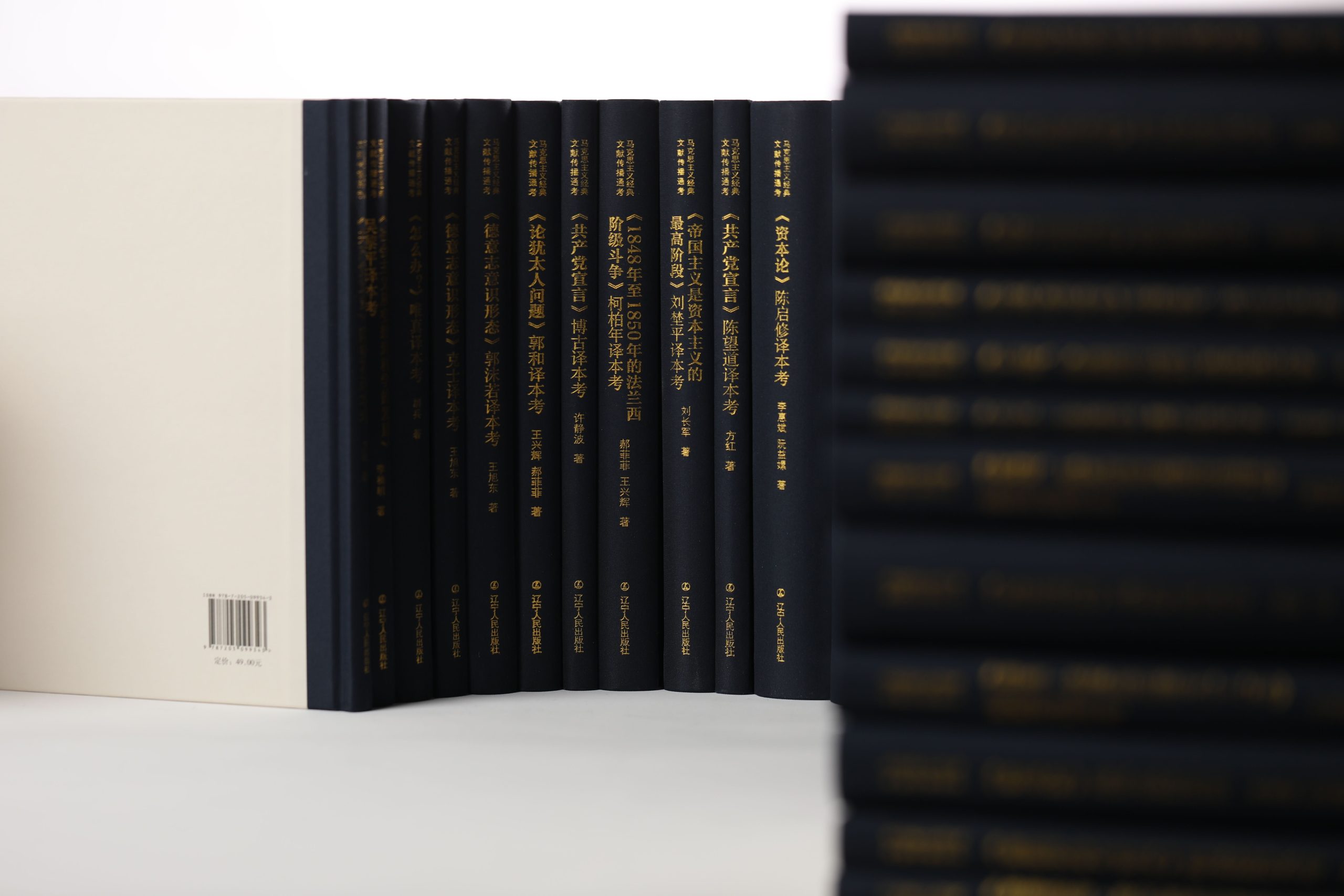
Series of General Examination on the Dissemination of Marxist Classical Documents
Author: Wang Zhanyi, former vice president of Inner Mongolia Branch of Xinhua News Agency